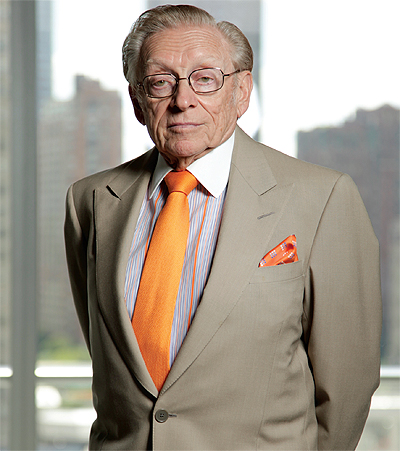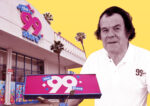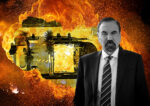Trending
The Closing: Larry Silverstein

Larry Silverstein (photo by Max Dworkin)
Just over 10 years ago, Larry Silverstein, president and CEO of Silverstein Properties, closed on the then-largest real estate transaction in the city’s history: a $3.25 billion, 99-year leasehold on the Port Authority’s 10.6 million-square-foot World Trade Center site. Seven weeks later, the buildings were destroyed in the Sept. 11 terrorist attacks, and Silverstein has spent the better part of the past decade focused on the rebuilding. His 52-story, 7 World Trade Center office tower is now more than 90 percent leased, while the 72-story, 4 World Trade Center is scheduled to open next, in 2013. An alumnus of New York University, Silverstein is the founder and chairman emeritus of NYU’s Schack Institute of Real Estate and a former vice chairman of the university’s Board of Trustees.
What is your full name?
Larry A. Silverstein. “A” stands for Abraham.
Date of birth?
The 30th of May, 1931.
You were born and raised in Bedford-Stuyvesant. Have you been back there recently?
Yes. I had dinner at … what’s that famous restaurant near the Williamsburg Bridge? Peter Luger’s. I had a dinner at Peter Luger’s and then I suggested to my wife, “Let’s see if we can find where I used to live.” I couldn’t find it. … The neighborhood has changed completely. It’s unrecognizable. … The quality of the housing and so forth, the shops, everything about it is much better.
What kind of house did you live in growing up?
We lived on the seventh floor of a seven-story walk-up.
Wow. Were you an athletic kid?
[Laughs.] I remember the ice man bringing up the ice for the ice box because we didn’t have a refrigerator. I remember walking up those steps — my God, that was a hike. And the ceiling had a tendency to sort of fall. … Everything used to leak.
Where do you live now?
Not in the same conditions. Now we live on Park and 59th.
Do you have any other homes?
No.
But you do have boats.
Yeah.
Last we heard, you were building a new yacht to replace your 131-foot boat, Silver Shalis. Have you taken it out for a spin yet?
Oh, yes. It’s a lot of fun.
Is it true that it cost more than $30 million?
That’s irrelevant.
Your father was also in the real estate business. What did you learn from him?
During the summers I’d leave NYU and work for my father. He was a leasing broker of loft space in the rags, woolens and remnants district in Lower Manhattan. Today you’d call it Soho. The rentals at that time were maybe 40 cents a foot, 50 cents a foot, 60 cents a square foot. It was all secondary, tertiary real estate. [It was] a difficult existence, but it showed me the value of a dollar. It showed me the art of negotiating.
Your daughter, Lisa, and your son, Roger, both work for Silverstein Properties. What kind of boss are you?
I think a dramatic, impossible, unpredictable, tyrannical individual who constantly changes his mind and moves off in different directions without predictability. Just a wonderful, wonderful experience to work with.
Do you have any plans to retire?
At the moment, my focus is on completing the World Trade Center, and my sense is that will be done by 2015, 2016. At that juncture, I’ll be 85, and assuming that I’m still in good health and have some energy, what I’m going to do [is] … I don’t have a clue.
You closed on your deal at the World Trade Center weeks before 9/11. Do you ever wish you had lost the bidding?
It’s funny but I don’t recall the focus [of my thoughts at that time], other than the disaster, and the magnitude of the problems we were facing as a result of it. And the loss of life was horrendous. We lost four of our people, four of our employees who had six children among them.
For years during the rebuilding negotiations, public opinion wasn’t exactly on your side. Did that bother you?
Did it bother me? Did it rankle me? Of course. You can’t escape that. But it became obvious to me early on that it was important to focus on rebuilding. The first thing we decided was to rebuild 7 [World Trade Center]. … We went into the ground in ’02. Everybody said it was gonna be a disaster, we’d never lease it, we’d never finance it, and so forth. Thank God they were all wrong. … By May of ’06 [we were] finished building and suddenly people began to look at this thing and say, “Hey, maybe he’s not the problem. Maybe the problem lies elsewhere.” And that’s when things began to change in our favor, significantly.
You were almost killed by a drunk driver shortly before your bid for the World Trade Center was due. And you would have been in the Twin Towers on 9/11 if not for a doctor’s appointment that morning. How do you feel about fate?
Life is very unpredictable, and very terminal, and serendipitous. I’m a fatalist, clearly. [When] I was hit by a drunk driver while I was crossing 57th Street, I thought I was going to die. The pain was horrendous. He broke my pelvis in 12 places. That kind of thing you can never fully recover from, so as I get older I feel it more intensely. That’s life.
You told The Real Deal in 2004 that you spend 20 to 21 hours a day, seven days a week, either thinking about or working on the WTC projects. Have things calmed down at all?
To some degree. But it’s been consuming. It’s been the focus of my business life … [laughs] … well, my life.
What’s your work schedule like now? Do you still wake up at 3 a.m. worrying about the rebuilding?
Well, not necessarily 3 a.m. Sometimes 2 o’clock, sometimes 4 o’clock. It varies.




